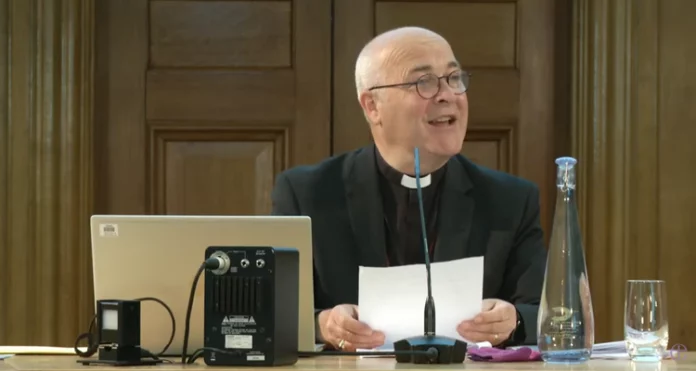There have been groans of derision following the proclamation by the Archbishop of York, Stephen Cotterell, that the opening lines to the Lord’s Prayer – ‘Our Father’ – might be ‘problematic’, owing to their ‘patriarchal’ connotations. Yet the cries of mockery and exasperation on social media, though justified, have also been mostly predictable. After all, trendy Anglican clerics have been with us for decades, forever providing us with a source of mirth and vexation. The Church of England has form here.
What is novel is the Archbishop’s deployment of the word ‘problematic’. In this, he reveals that he really is with the zeitgeist, and really is down with the kids. For ‘problematic’ is one of the most favoured words by those who follow the church of woke. It encapsulates an outlook of passive-aggressive judgementalism masquerading as non-judgementalism.
‘Problematic’ really has become a word that encapsulates a new, popular moral code
After all, no-one wants to appear openly judgemental these days. It looks authoritarian. No one in their right mind seeks to find converts to a frame of mind by uttering ‘Thou Shalt Not’. This is why even the Conservative party shies away from telling people what to do, preferring instead to ‘nudge’ them in the right direction.
This doesn’t mean we live in a society free from authoritarian ideology, from people who seek to tell us what we can and can’t say or do. Quite the reverse. We live in a ‘cancel culture’, one of censure of censorship, of no-platforming and people losing their jobs for expressing ‘inappropriate’ points of view. Such is the crisis of liberty we have today that the very principle of free speech has itself become a persistent subject of debate.
Those doing this bullying and the censoring usually fall under that most intolerant secular creed which brooks no dissent and tolerates no dissenters. But unlike secular ideologies of yore such as communism or fascism, modern day advocates don’t use belligerent language, but rather the opposite. They use the language of compassion and inclusivity. Political correctness, we were once told, was merely about ‘politeness’; now the hashtag #BeKind is deployed to clobber people.
But as anyone who has felt the wrath of #BeKind types – the hashtag has become a licence to be as vile as one pleases – or the muzzling impulses of Hope Not Hate, nice words can be deceptive. So can euphemism. That’s why the innocuous word ‘problematic’ is so dangerous. It’s a first step towards seeking to ban something that offends their sensibilities.
And if not ‘problematic’, there are other slippery, evasive passive-aggressive words the wokerati are fond of: ‘offensive’, ‘inappropriate’ and ‘unhelpful’. All such language appears sensitive, thoughtful and ‘inclusive’ (another word that masks a doctrinal impulse, really meaning ‘don’t say anything that might hurt someone’s feeling’). All such words are ostensibly non-judgemental, but all hide a profoundly judgemental impulse. They are employed by people who want to censor and silence others.
And it works. It was a master-stroke by a group like Black Lives Matter to use that name. Who, after all, could complain with the sentiments embodied in that appellation? Only racists, surely. And so it transpired that by 2020 this group had millions across the world literally on bended-knee displaying obeisance. Black Lives Matter succeeded by having an innocuous name which no-one could disagree with.
Read it all at the Spectator



